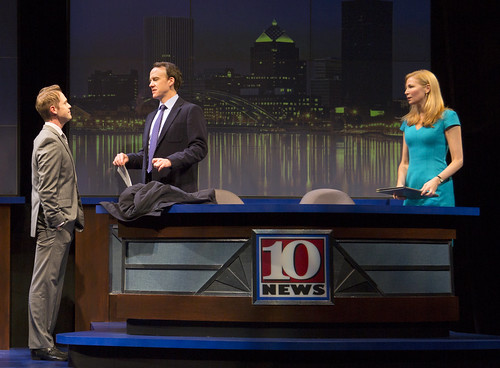
Photo: T.Charles Erickson
Presented by The Huntington Theatre Company
By Stephen Belber
Directed by Peter DuBois
October 23 – November 16, 2013
Calderwood Pavilion at the BCA
527 Tremont Street
Boston, MA
Hunting Theatre Co on Facebook
Review by Gillian Daniels
(Boston) In a television studio’s newsroom, sentiment is well known. It’s strange that The Power of Duff’s main conceit is that news anchor Charles Duff (the excellent David Wilson Barnes) scandalizes a nation by praying on air at the end of the show’s broadcast. While the reactions to Duff’s sermons are difficult to swallow, especially in the play’s first half, it’s fascinating to watch the everyday lives of these characters unravel as they reach out to connect with one another.
Barnes’s Duff has cultivated a dry and unflappable persona in both his professional and personal life. He jokes with dorky sports newscaster John Ebbs (Brendan Griffin) and defers to the all-business attitude of fellow news anchor, Sue Raspell (a vulnerable, brilliant performance from Jennifer Westfeldt). The mask that Duff has put so much work into maintaining begins to slip once he learns of his father’s death. Far from breaking down dramatically, Duff appears absolutely placid when, he offers a prayer for his departed father to his television audience.
The play’s initial attempt to dramatize the incident and what follows is over-the-top. It’s a misstep when network executive Scott Zoellner (Ben Cole) swears out Duff for being religious rather than being unprofessional. Cole’s performance as a paper-thin, “evil atheist” deepens once the character’s background is revealed, but not before.
Also in the first half of The Power of Duff, the female characters come off as no-nonsense shrews. Raspell responds to Duff with condescension and ex-wife Lisa Duff (Amy Pietz) doesn’t hesitate to point out Charles’ numerous failures, flaws, and hypocrisy in telling other people how to be better. The men, it seems, are just average joes, palling around, whatever their mistakes, and the women are there to correct them. Later, thankfully, the dynamic begins to shift in surprising ways in a stronger, more intense second act.
Playwright Stephen Belber develops his characters naturally and with sympathy. Not all of his dialogue quite works, though Griffin tries his hardest to give every last one of John Ebbs’ one-liners life. Still, the play manages an excellent balance between humor and drama, especially with Russell G. Jones’ immigrant janitor Joseph Adango and Joe Paulik’s multiple, hilarious characters.
The Huntington Theatre Company should also be applauded for its clever use of video segments. Its intricate staging is also impressive.
While the first act suffers from a plot that feels contrived, the second half of The Power of Duff takes off when it discusses the connective tissue of community and faith. Certainly, the play reaches new heights when Duff begins to turn the questions he directs at his audience back on himself. Where the play goes from there is absolutely stunning and, yes, as promised, powerful.
